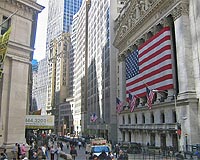| . |  |
. |
Beijing (AFP) Dec 4, 2009 China has accused several foreign investment banks of "maliciously" selling derivative products to dozens of state-owned companies, which then booked more than 11 billion yuan in losses on the deals. The losses were "closely associated with the intentionally complex and highly leveraged products that were fraudulently peddled by international investment banks with evil intentions," said Li Wei, vice chairman of the State-Owned Assets Supervision and Administration Commission (SASAC). "To some extent some international investment banks were the chief culprits and the root of ruin for the Chinese enterprises who encountered this financial derivatives Waterloo." Li singled out Goldman Sachs, Merrill Lynch, Morgan Stanley and Citigroup in the article published in the latest edition of the Study Times, an official Communist Party newspaper. He said 68 of the more than 130 companies controlled by SASAC bought derivatives to hedge against rising commodity prices and fluctuating exchange and interest rates. These companies, including major airlines, incurred paper losses of 11.4 billion yuan (1.67 billion dollars) on the 125 billion yuan worth of derivative contracts bought by the end of October 2008, he said. But Li said state-run firms should not "give up eating for fear of choking", noting derivatives offered opportunities to hedge against potential risk and companies will find it hard to compete with foreign rivals without them. He urged these companies to comply with regulations and make sure any investments in derivative products were done to hedge risk rather than speculate in the market. The regulatory watchdog said in September it would support state-owned companies that take legal action over the heavy losses. The agency said at the time some firms had already notified foreign banks that they were considering legal action over contracts for oil-related structured options. SASAC ordered state firms in March to reconsider their derivative investments overseas and back out of high-risk contracts after several Chinese firms reported huge losses. State-owned carriers Air China, China Eastern and Shanghai Airlines reported losses of almost two billion dollars since last year on aviation fuel hedging contracts. In August, Caijing magazine reported, citing an unnamed state enterprise executive, that only 31 state-owned firms were licensed to enter into such deals, while many more were apparently doing so. Share This Article With Planet Earth
Related Links The Economy
 US lawmakers vote to curb firms 'too big to fail'
US lawmakers vote to curb firms 'too big to fail'Washington (AFP) Dec 2, 2009 A US House of Representatives committee on Wednesday approved key regulatory legislation intended to curb the harmful economic effects of financial services institutions deemed "too big to fail." The bill, which is meant to keep the collapse of large institutions from provoking system-wide crises, passed in the Financial Services Committee by 31 votes to 27. The Financial Stability ... read more |
|
| The content herein, unless otherwise known to be public domain, are Copyright 1995-2009 - SpaceDaily. AFP and UPI Wire Stories are copyright Agence France-Presse and United Press International. ESA Portal Reports are copyright European Space Agency. All NASA sourced material is public domain. Additional copyrights may apply in whole or part to other bona fide parties. Advertising does not imply endorsement,agreement or approval of any opinions, statements or information provided by SpaceDaily on any Web page published or hosted by SpaceDaily. Privacy Statement |